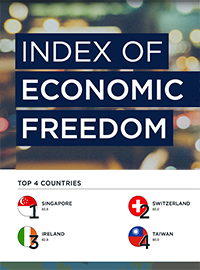| “Bidenomics” - U.S. Falls to Record Low in Annual Index of Economic Freedom |
 |
|
By Timothy H. Lee
Thursday, March 07 2024 |
The interrelationship between economic freedom and societal prosperity across the expanse of human history remains self-evident to reasonable minds. It’s nevertheless invaluable to possess a tool to objectively measure economic freedom and quantify its causal relationship with societal prosperity. That’s precisely what the Heritage Foundation’s annual Index of Economic Freedom provides, for which we should be collectively grateful. Unfortunately, this year the United States fell to its lowest position in the history of the Index, which probably won’t surprise those who value economic freedom. Now in its 30th edition, the Index has measured the world’s nations each year since 1995 on 12 factors using a 0 to 100 scale. Those 12 overarching factors are organized into four broader pillars of economic freedom: (1) Rule of Law (including the three subcategories of property rights, government integrity and judicial effectiveness), (2) Government Size (including the three subcategories of government spending, tax burdens and fiscal health), (3) Regulatory Efficiency (including the three subcategories of business freedom, labor freedom and monetary freedom) and (4) Open Markets (including the three subcategories of trade freedom, investment freedom and financial freedom). Employing those categorical scores, individual nations are then organized into five levels of economic freedom: (1) Free, (2) Mostly Free, (3) Moderately Free, (4) Mostly Unfree and (5) Repressed. In turn, the Index statistically correlates nations’ economic freedom with their prosperity and overall well-being: Economic freedom brings greater prosperity. The Index of Economic Freedom documents the positive relationship between economic freedom and a variety of positive social and economic goals. The ideals of economic freedom are strongly associated with healthier societies, cleaner environments, greater per capita wealth, human development, democracy, and poverty elimination. Here's how that objective, quantifiable correlation plays out in actual income: Nations in the “Free” category boast average incomes of $103,869, while “Mostly Free” nations fall 40% lower at $61,052, “Moderately Free” nations claim an average of just $32,225, “Mostly Unfree” countries average just $10,637 and “Repressed” nations just $10,389. In simple, clear mathematical terms, greater economic freedom means greater prosperity. With that in mind, it shouldn’t come as any surprise that under Joe Biden and his “Bidenomics” agenda, the U.S. has plummeted to an all-time low. We now rank a disturbing 25th in the world, and with an overall score of 70.1 we’re down 0.5 since last year and now just 0.2 points from falling into the “Moderately Free” category: The United States’ once-esteemed “Mostly Free” ranking continues to diminish, this year reaching the lowest level in the 30-year history of the Index at 70.1. The U.S. sustained its global ranking of 25th freest in the 2024 Index. The Biden administration’s misguided anti-growth economic and entrepreneurial policies and mounting deficit spending fueled this decline, as examined in the report. Recovery, however, is possible. “Restoring the U.S. economy to ‘free’ status,” the Index emphasizes, “will require significant changes to reduce the size and scope of government.” In that vein, it’s worth highlighting that as recently as 2019, the U.S. stood at 12 after plummeting from 6 to 18 during the Obama years. America’s economic freedom has seen a dramatic boost – from 18th place in the world to 12th place in the span of just one year. America’s score ticked up by more than a full point from last year, reaching the highest level in eight years. The vibrant growth we’re feeling has been unleashed by several key policy changes over the past two years, the most important being the 2017 tax cuts and deregulation. Real gross domestic product grew by upward of 3 percent over the last four quarters – unlike anything seen in the last 13 years. Accordingly, our downward trajectory can be reversed. To accomplish that improvement, however, we obviously must identify the cause of our recent decline. Fortunately, Americans seem to understand that reality. Specifically, by a 52% to 38% majority, voters prefer a “smaller government with fewer services and lower taxes” to “a more active government with more services and higher taxes.” Additionally, polls show a deepening preference for Donald Trump, who rapidly elevated the U.S. ranking during his last term as noted above, to his successor Joe Biden under whom we’ve resumed our alarming decline. It’s not too late, but it’s getting late. |
Related Articles : |
























